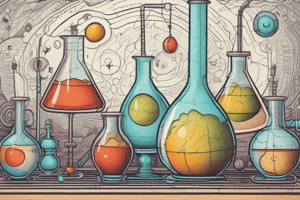Podcast
Questions and Answers
Flashcards
Scientific Method
Scientific Method
A systematic process for investigating phenomena, acquiring new knowledge, or correcting and integrating previous knowledge.
Hypothesis
Hypothesis
A proposed explanation for a phenomenon, which can be tested through experiments.
Theory
Theory
A well-substantiated explanation of an aspect of the natural world that is based on a body of evidence.
Controlled Experiment
Controlled Experiment
Signup and view all the flashcards
Independent Variable
Independent Variable
Signup and view all the flashcards
Dependent Variable
Dependent Variable
Signup and view all the flashcards
Control Group
Control Group
Signup and view all the flashcards
Experimental Group
Experimental Group
Signup and view all the flashcards
Constants
Constants
Signup and view all the flashcards
Replicates
Replicates
Signup and view all the flashcards
Quantitative Data
Quantitative Data
Signup and view all the flashcards
Qualitative Data
Qualitative Data
Signup and view all the flashcards
Cells
Cells
Signup and view all the flashcards
Asexual Reproduction
Asexual Reproduction
Signup and view all the flashcards
Sexual Reproduction
Sexual Reproduction
Signup and view all the flashcards
DNA
DNA
Signup and view all the flashcards
Development
Development
Signup and view all the flashcards
Metabolism
Metabolism
Signup and view all the flashcards
Autotroph
Autotroph
Signup and view all the flashcards
Heterotroph
Heterotroph
Signup and view all the flashcards
Stimulus
Stimulus
Signup and view all the flashcards
Homeostasis
Homeostasis
Signup and view all the flashcards
Evolution
Evolution
Signup and view all the flashcards
Proton
Proton
Signup and view all the flashcards
Neutron
Neutron
Signup and view all the flashcards
Electron
Electron
Signup and view all the flashcards
Valence Electrons
Valence Electrons
Signup and view all the flashcards
Covalent bond
Covalent bond
Signup and view all the flashcards
Molecule
Molecule
Signup and view all the flashcards
Ionic bond
Ionic bond
Signup and view all the flashcards
Study Notes
Scientific Method
- A systematic approach to investigating phenomena and acquiring knowledge.
Key Concepts in the Scientific Method
- Hypothesis: A proposed explanation for a phenomenon, testable through experiments.
- Theory: A well-supported explanation of natural phenomena, based on evidence.
- Controlled Experiment: An experiment where all variables are controlled except for the one being tested.
- Independent Variable: The variable deliberately changed in the experiment.
- Dependent Variable: The variable measured as a result of the independent variable.
- Control Group: A group not exposed to the treatment, used as a comparison.
- Experimental Group: A group exposed to the treatment being tested.
- Constants: Factors that remain the same throughout the experiment.
- Replicates: Repeating the experiment to ensure reliability.
- Quantitative Data: Numerical data collected during experiments.
- Qualitative Data: Descriptive data collected, often non-numerical.
Biology Fundamentals
- Cells: The basic units of life, found in all living organisms.
- Asexual Reproduction: Reproduction without fusion of gametes.
- Sexual Reproduction: Reproduction involving the fusion of male and female gametes.
- DNA: Deoxyribonucleic acid, carrying genetic information.
- Development: The growth and differentiation of an organism.
- Metabolism: The chemical reactions supporting life.
- Autotroph: An organism that produces its own food (e.g., through photosynthesis).
- Heterotroph: An organism that consumes other organisms for food.
- Stimulus: A detectable change in the environment causing a response.
- Homeostasis: Maintaining stable internal conditions.
- Evolution: The change in heritable characteristics of biological populations over generations.
Chemistry Fundamentals
- Atom: The basic building block of matter.
- Proton: Positively charged subatomic particle in the nucleus.
- Neutron: Neutral subatomic particle in the nucleus.
- Electron: Negatively charged subatomic particle orbiting the nucleus.
- Valence Electrons: Electrons in the outermost shell, involved in bonding.
- Covalent Bond: Atoms share electron pairs.
- Molecule: Multiple atoms bonded together.
- Ionic Bond: Transfer of electrons between atoms.
- Hydrogen Bonds: Weak attractions between hydrogen and electronegative atoms.
- Polar Molecules: Unequal charge distribution within a molecule.
- Hydrophobic: Substances repelling water.
- Hydrophilic: Substances attracted to water.
- Cohesion: Attraction between like molecules.
- Surface Tension: The resistance of a liquid's surface to external force.
- Adhesion: Attraction between unlike molecules.
- Heat Capacity: The amount of heat required to change temperature.
- Solution: Homogenous mixture of two or more substances.
- Solute: The substance dissolved in a solution.
- Solvent: The substance that dissolves the solute.
- pH: Measure of acidity or basicity of a solution.
- Acid: Substance releasing protons (H+).
- Base: Substance accepting protons (H+).
Biological Molecules
- Macromolecule: Large complex molecule, often assembled from smaller subunits.
- Carbohydrate: Organic compound with carbon, hydrogen, and oxygen (1:2:1 ratio).
- Lipid: Hydrophobic molecule (e.g., fats, oils).
- Protein: Large biomolecule made of amino acid chains.
- Nucleic Acid: Biomolecule essential for life (e.g., DNA, RNA).
Chemical Reactions
- Chemical Reaction: Transformation of one substance to another.
- Conservation of Matter: Matter isn't created or destroyed in a closed system.
- Reactants: Substances undergoing change in a reaction.
- Products: Substances formed from the reaction.
- Enzyme: Protein catalyst for chemical reactions.
- Anabolic: Building complex molecules.
- Catabolic: Breaking down complex molecules.
- Endothermic: Reaction absorbing energy.
- Exothermic: Reaction releasing energy.
Ecology
- Ecosystem: Interacting organisms and their physical environment.
- Biotic: Living components of an ecosystem.
- Abiotic: Non-living components of an ecosystem.
- Producer: Organism creating its own food.
- Consumer: Organism consuming other organisms.
- Carnivore: Meat-eating organism.
- Herbivore: Plant-eating organism.
- Omnivore: Eating both plants and animals.
- Detritivore: Consuming dead organic material.
- Decomposer: Breaking down dead organisms.
- Scavenger: Consuming dead organisms not killed by them.
- Food Chain: Linear feeding sequence through an ecosystem.
- Food Web: Complex network of interconnected food chains.
- Trophic Level: Organism's position in a food chain.
- 10% Rule: Only about 10% energy transfers between trophic levels.
- Trophic Cascade: Impact of top predators on other species.
- Water Cycle: Continuous movement of water.
Cell Structure and Function
- Cell Theory: All living organisms are composed of cells.
- Prokaryotic Cell: Lacks a nucleus and membrane-bound organelles.
- Eukaryotic Cell: Has a nucleus and membrane-bound organelles.
- Cytoplasm: Substance inside the cell, excluding the nucleus.
- Nucleus: Organelle containing cell's genetic material.
- Vesicle: Small membrane-bound sacs for transport within the cell.
- Ribosomes: Synthesize proteins.
- Endoplasmic Reticulum: Synthesizes proteins and lipids.
- Membrane Proteins: Proteins associated with biological membranes.
- Phospholipid: A major component of cell membranes.
- Semipermeable Membrane: Allows selective passage of molecules.
- Active Transport: Movement of molecules across membranes using energy.
- Osmosis: Diffusion of water across a semipermeable membrane.
- Tonicity: The ability of a solution to cause a cell to gain or lose water.
- Dilute: Low solute concentration.
- Concentrated: High solute concentration.
- Isotonic: Equal solute concentration.
- Hypertonic: Higher solute concentration outside the cell.
- Hypotonic: Lower solute concentration outside the cell.
- Lysis: Cell bursting.
- Crenation: Cell shrinking.
- ATP/ADP: Energy currency of cells (ATP) and product of its use (ADP).
Studying That Suits You
Use AI to generate personalized quizzes and flashcards to suit your learning preferences.




